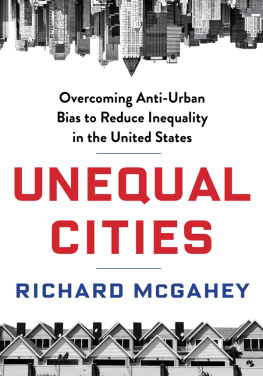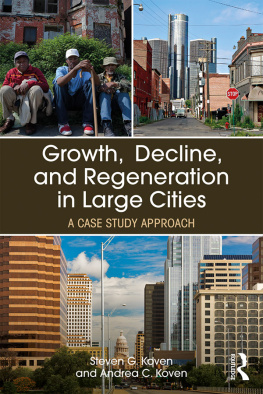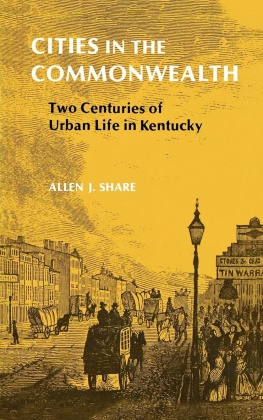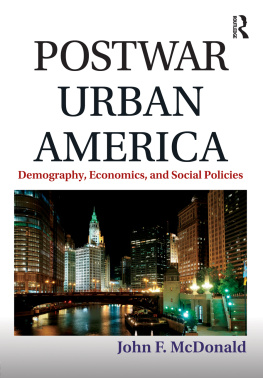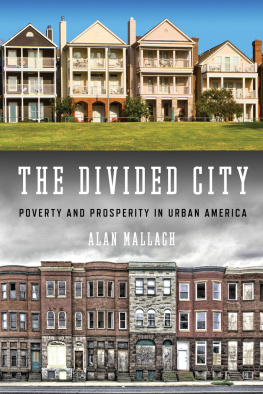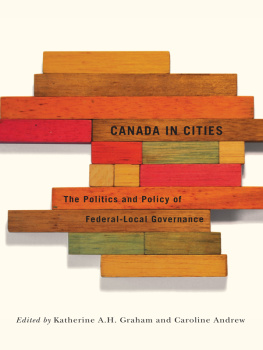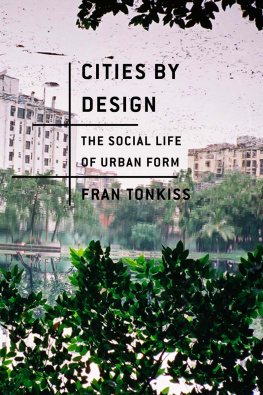Table of Contents
Unequal Cities
Unequal Cities
Overcoming Anti-Urban
Bias to Reduce Inequality
in the United States

Richard McGahey
Columbia University Press
New York
Columbia University Press
Publishers Since 1893
New YorkChichester, West Sussex
cup.columbia.edu
Copyright 2023 Columbia University Press
All rights reserved
EISBN 978-0-231-55773-3
Library of Congress Cataloging-in-Publication Data
Names: McGahey, Richard, author.
Title: Unequal cities : overcoming anti-urban bias to reduce inequality in the
United States / Richard McGahey.
Description: New York : Columbia University Press, 2022. |
Includes bibliographical references and index.
Identifiers: LCCN 2022014886 | ISBN 9780231173346 (hardback) |
ISBN 9780231557733 (ebook)
Subjects: LCSH: Urban economicsUnited States. | Income distribution
United States. | EqualityUnited States.
Classification: LCC HT321 .M35 2022 | DDC 330.9173/2dc23/eng/20220401
LC record available at https://lccn.loc.gov/2022014886
A Columbia University Press E-book.
CUP would be pleased to hear about your reading experience with this e-book at .
Cover design: Noah Arlow
Cover images: Shutterstock
Contents
P edestrians in New York City walking along Park Avenue between East 56th and 57th Streets can look upand up and upat an implausibly narrow and tall apartment building rising 129 feet higher than the Empire State Building. The soaring height isnt the most notable thing about this super slender
The COVID-19 recession hit cities hard, but it also underscored the second major aspect of Americas cities: inequality. Fortune magazine dubbed 432 Park as the house that inequality built. Its architect, Rafael Violy, saw a polarized city, saying, There are only two markets, ultraluxury and subsidized housing.in high-wage jobs recovered by October 2020, while lower-wage jobs remained 19.2 percent below prepandemic levels, down 27 percent in Boston and 34.7 percent in Chicago. But even with these lagging job recoveries, cities and metropolitan areas will drive future prosperity.
Urban Economies in Politically Fragmented Regions
Cities central economic role was lifted up in Harvard economist Edward Glaesers 2011 best-selling book, Triumph of the City. Glaeser claimed humans are an urban species and urban density provides the clearest path from poverty to prosperity.
Why are cities central to economic prosperity? Although economists agree cities are key to a nations growth, it isnt a universally recognized view. If you search the internet for the key to American prosperity, youll find claims for agriculture, intact families, developing womens workforce potential, Christianity, fracking, stable Federal Reserve interest rate decisions, and many other factors.
Glaesers case for cities rests on data. In 2020, U.S. metropolitan areas produced 89 percent of real GDP. The New York metro regions economic output was larger than that of Canada, Russia, or the state of Texas. Los Angeles regional GDP was greater than that of the state of Pennsylvania. In 2018, the combined output of Americas top ten metros exceeded the total output of thirty-eight states.
Americas polarization and recent electoral results reflect the economic divide between urban and rural areas. In both the 2016 and 2020 presidential elections, counties won by Democrats produced a significant majority of Americas jobs and economic output. The counties won by Democratic presidential candidate Joe Biden produced 71 percent of GDP in 2020, while Republican presidential candidate Donald Trump won in counties producing 29 percent of GDP.
Although the urban-rural economic gap is important, it can obscure inequality within Americas urban areas. Too often, analysts use the terms cities and metropolitan areas interchangeably, using data on metropolitan regions to make conclusions about cities. But they are not the same thing. Metropolitan areasregional economies with a core city surrounded by many separately governed, smaller cities and suburbsdo produce economic prosperity. But cities at the center of these metros have inherited poverty, outdated infrastructure, inadequate schools and housing, and reduced tax capacity. This disjunction between the overall regional economy and its fragmented governance is central to understanding inequality. And even the most prosperous cities have a great deal of internal poverty and inequality.
The nations economic divisions also cant be understood through a simple urban-rural dichotomy. Metropolitan areas with faster economic and growth also have high inequality. Many urban workers have more in common economically with people in declining rural areas than they do with the urban super-rich or suburban residents in separately governed towns who resist housing expansion, school integration, and revenue sharing. Aligning economics and policy must recognize the essential economic role of cities. But for shared and sustainable prosperity, we also need to address historic, structural, racial, and political barriers to greater equality that too often are neglected by market-oriented economics.
Focusing on strong metropolitan economies can distract us from the often-troubled cities at their cores. Failing to distinguish between cities and metros obscures political, economic, and racial disparities and makes new policies imprecise and ineffective. In the nineteenth century, states solidified their power over cities, controlling cities annexation and financial powers, thus limiting their growth and removing their fiscal autonomy. States victory in this power struggle is a major factor in the creation of todays metropolitan structures.
Although core cities are essential for regional economies, they are hemmed in geographically by politically independent and often hostile suburban jurisdictions. Many of those suburbs have higher incomes and wealth; restrictive zoning and housing policies; less racial and ethnic diversity; better schools; and fewer social problems such as crime, poverty, and rampant inequality.
Americas urban regions are fragmented with mismatched and often racially divided political and economic boundaries. Cities drive regional (and national) economic growth, but suburbs disproportionately reap
Many economists agree that American public policy is deeply unfair to cities. Glaeser has decried an anti-urban bias pervading federal transportation, housing, and education policies. If the economic benefits from cities cited by economistsinnovation, growth, progressare central to regional and national prosperity, why are American metropolitan areas so economically and socially unbalanced? Why are wealthy suburbs that depend economically on cities not paying their fair share for dealing with urban problems?
Glaeser and other economists arent excessively troubled by inequality concentrating in cities. Indeed, in their view, inequality can be a healthy sign: Cities arent full of poor people because cities make people poor, but because cities attract poor people with the prospect of improving their lot in life. Inequality will recede with improved education, which in turn will improve economic outcomes. Inequality can also be good if caused by market forces rewarding education and technological innovation.

